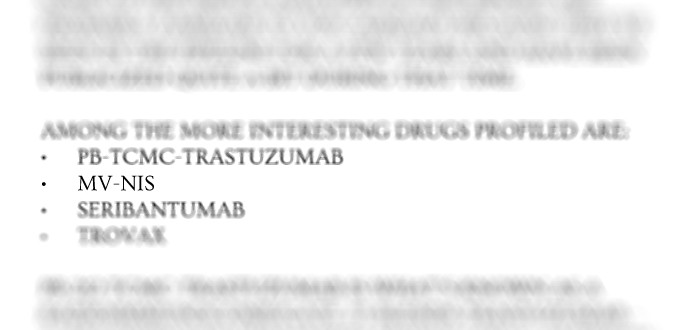A newly issued overview report about peritoneal cancer therapies in development suggests many reasons to be hopeful that a potent treatment for peritoneal mesothelioma is not far away.
In fact, the report offers at least 65 such reasons for hope — 65 being the number of drugs currently in the R&D pipeline.
The report, prepared by RnRMarketResearch.com, is entitled “Peritoneal Cancer Therapeutics Pipeline Review H1: 2015 Market Research Report.” The report notes that among the primary malignant diseases occurring within the peritoneal cavity is malignant mesothelioma.
Many of the drugs showcased in the report specifically address peritoneal mesothelioma, but many more are designed to attack additional forms of peritoneal cancer.
The report provides profiles of the companies involved in the development of peritoneal cancer therapeutics. Some of the companies are household names, while others are not as well-known but no less vital. Companies included are AstraZeneca, Bayer, Eli Lilly and Co., F. Hoffmann-La Roche, GlaxoSmithKline, Johnson & Johnson, Merck & Co., Novartis, Amgen, Genentech and ImmunoGen.
Innovative Drugs to Attack Mesothelioma
Some of the drugs analyzed in the report are probably familiar to you already because they’ve been in the pipeline for a few years and have been publicized quite a bit during that time.
Among the more interesting drugs profiled are:
- Pb-TCMC-trastuzumab
- MV-NIS
- Seribantumab
- TroVax
Pb 212 TCMC-trastuzumab is what’s known as a radioimmunoconjugate. It blends trastuzumab — a recombinant humanized monoclonal antibody — with the bifunctional chelating agent TCMC.
TCMC stands for: 1,4,7,10-Tetra-(2-Carbamoyl Methyl)-Cyclododecane. This combination is then radio-labeled with the alpha-emitting isotope known as lead Pb 212. Put it all together and you have Pb 212 TCMC-trastuzumab.
Pb 212 TCMC-trastuzumab works by first grabbing firmly onto the human epidermal growth factor receptor 2 — HER2 — which is an overexpressed tyrosine kinase receptor found on many types of cancers.
Next, the Pb 212 TCMC-trastuzumab feeds a deadly dose of radiation through the HER2 receptor. The cancer cell dies a while later.
Mesothelioma Catches the Measles
Another noteworthy drug in the pipeline is MV-NIS, an engineered measles virus. Formally, it’s called an oncolytic measles virus encoding thyroidal sodium iodide symporter.
When mesothelioma catches the measles, the cancer’s cells suffer tremendous damage. At least they do from what can be determined by the limited testing so far.
Then there is seribantumab, a fully human IgG2 antibody that prevents heregulin from binding to the molecule ErbB3.
This binding action has the effect of disrupting a cancer cell’s ability to defend itself against other anticancer therapeutics. Scientists think that cancers resist the effects of drugs designed to destroy them by up-regulating the signals drawn from heregulin.
Those signals are normally channeled by the cancer through the ErbB3/PI3K/Akt pathway. Scientists believe that blocking the pathway leaves the cancer vulnerable.
TroVax, on the other hand, is designed to make it easier for the immune system to seek and destroy cancer.
TroVax is said to have an affinity for the protein 5T4, which mesothelioma cells possess. Being a vaccine, TroVax stimulates the immune system and works it up into a frenzy over 5T4.
There are, of course, more than 60 other drugs discussed in the report. Unfortunately, it costs $2,000 to purchase the full document.
But you should feel free to mention it to your mesothelioma doctor or to the people who manage the mesothelioma clinic where you receive treatment.
They may find it’s worth its weight in gold where your fight against mesothelioma is concerned.

